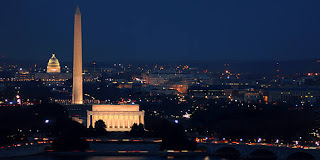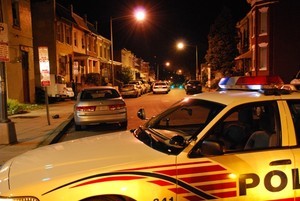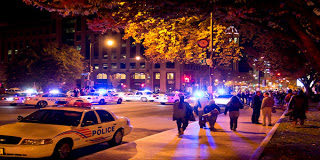The Great Power of Washington
By Daniel Greenfield
SultanKnish.Blogspot.com
As I write this the sun has set, the shadows
crawling up and down the grid of America's first
truly planned city. There was a time when it was
thought that the Potomac extended across the
continent and the city of government would lie at
the opening of an interstate aquatic highway. That
was not to be. And like so many other dreams of
government, the Washington City Canal has seen
better days.
Washington D.C. is America, as many of the men
and women who work in government envision it. It is
a place of great wealth and great poverty. Incomes
continue to rise for those in government. D.C. and
its bedroom communities hold some of the greatest
reserves of wealth in the the country, but its
poverty level hovers just below 20 percent. And
nearly a third of the children of the capital of
our government live in poverty.
Gun control is very much on the minds of the
government elite these days, and it should be,
working in a city with a higher murder rate than
Mexico City. African-Americans only make up half the
population of D.C. but black males account for 80
percent of its homicide victims. The
black murder rate in D.C. is 37.7 per 100,000
people. The white murder rate however is less than
most of the rest of the country. Guns are used in
the vast majority of these killings.
1 in 8 households in D.C. struggle with hunger. D.C.
public schools
have a 56 percent graduation rate for students
in general and
41 percent for black males. This is what the
city that runs the country that runs the world looks
like. This is where the great planners make their
plans while just out of sight lies another great
urban failure where plans go to die.
Washington D.C. cannot fix itself. The national
government based out of the city certainly cannot
fix the nation. There are two Washingtons here side
by side. One is the Washington of the professional
government technocracy; the imperial Washington of
ceremony and ritual, where massive numbers of
staffers and bureaucrats pack in to attend to the
great grid of the nation. The other Washington is no
different than Chicago or Detroit, except that its
only dying industry is the great machine of
government.
These same two visions haunt the modern urban center
and its shaky coalition between the government
worker and the government welfare case. Here the
white collar professional can reach the peak of his
career while embedded deep in the bureaucratic
trenches of the war on poverty in a city where
poverty is an abiding reality. Here men and women
can have full time careers pretending to solve the
unsolvable problems of a nation.
The bureaucracy takes 90 percent of the funds for
the war on poverty and the poor get the other 10
percent, along with an invitation to protest and
demand more money, of which they will receive the
same cut. This is Washington, where annual trillion
dollar deficits are the new normal, but it's also
Albany, Providence and Sacramento. This is the way
that the best and brightest have run the modern city
and the modern country into the ground on this side
of the ocean and the other side of the ocean as
well.
This urban coalition between professional poverty
warriors and the professional poor is a perversion
of the original vision of the reformers who sought
to break away from the shameless exploitation of
human misery by Democratic political machines. These
reformers, many of them Republicans, tried to
replace permanent misery with meaningful solutions.
Along the way they became a technocracy, a
professional class, in and out of government,
fossilized reformers whose institutions are most in
need of reform. The reformers who battled the old
Democratic political machine became the new
Democratic political machine.
With Obama's victory in two elections, that
coalition is the new national power. The urban
political machine has managed to do what it was only
able to do only twice before in the 20th Century
with JFK and FDR. Its empty visions and emptier
phrases, its constituency of the perpetually
oppressed and its bureaucracy, whose bread and
butter is human misery, is once again the plan of
the planners who are always making new charts and
diagrams, and writing up new policy proposals that
will finally lick poverty for good.
The urban technocracy excels at charting the
movements of people. Breaking down an entire city
into a mass of data is essential for municipal
governments and businesses. Organizing some of those
people into a mob is something that its specialists
also do well. But for all their success at mass
movements and mass culture, they have never learned
that the true secret of the city is that it runs
itself. The planners may draw their grids, write up
their reports, issue their directives and pass them
along down to the lowliest official on the totem
pole. And then the mass of people in the city will
do what it wants to anyway.
When the urban technocracy succeeds in getting its
way, as it did with sterile blocks of housing towers
or running highway systems through major cities,
then the affected portion of the city often dies,
forming into an ugly clot around the infection.
Urban technocracies have left such clots in most
major cities and the national technocracy under FDR
and JFK/LBJ made its own clots that led to race
riots and mass poverty.
What the old machine politicians, the ward bosses
who walked the block and called out every family by
name, knew, and their urban technocratic successors,
with sociology degrees and statistical analysis
skills, don't, is that people run their own lives.
When they stop doing that and actually allow the
bureaucrats to have their way with them, then those
people become dead zones, concrete blocks around
underpasses, bodies shuffling along with little
thought for anything but the momentary sensory
pleasures of the day.
What is true for the city, is all the more true for
the country. The war on poverty was never there for
the bureaucrats to win or lose. It was there for the
people to win or lose. And when the bureaucrats took
over the war on poverty, that had formerly been
fought by families and communities, then the
bureaucrats won the war and the people lost. The
office towers, generous benefits and permanent
positions are the spoils of the technocracy's
victory. The decaying neighborhoods and gun violence
are the marks of defeat for those the technocracy
claims to watch over.
The urban technocracy has ruined most of the
country's major cities. Now it is doing to the city
what it did to the country. And the sight of all
that misery cannot dissuade it from its confidence
in its own cleverness. Its second victory has only
persuaded it of its own genius, a feeling that
pervades the ranks of Obama Inc. from the amateur
Chicago politician at the top, down to his cronies
all of whom are now more convinced than ever before
that they cannot fail.
It is that sense of infallibility that is most
identified with the technocracy and the new
liberalism that has been remade in its image. It is
a glibness born out of excessive self-esteem and
self-assurance that launches billion dollar
companies with no business plan and authorizes
projects on an impulse without truly understanding
them. That same sense of cleverness leads
technocracy to spend trillions of dollars without
being concerned whether that money will ever be
repaid.
The urban technocracy is always convinced that its
latest policy is the right one. It does not learn
from its mistakes or acknowledge failures. It
defines itself entirely by successes while
completely disregarding setbacks. It does not care
for people, it cares for ideas, and it often
confuses its embrace of an ideal society with a
concern for people without ever realizing that the
two are not at all the same thing. Ideas are how the
technocracy reinforces its assessment of its own
cleverness. And those ideas have as much to do with
people, as the towering housing blocks that were
supposed to be the ideal residences of the future
have to do with how people actually live.
The one thing that Washington D.C. has never
understood is that it does not run America. It is
just as incapable of understanding this as every
ruler in history. A government can issue decrees and
punish those who disobey. It can levy fines, build
prisons and equip police forces to enforce them.
What it cannot do however is implement a policy in
such a way that its execution exactly matches the
intention. The whip cracks, the people veer and the
law of unintended consequences takes over.
Obama does not understand that just because he won
two elections does not mean that he runs the
country. Outside the safe areas of government
control is a wilder and woolier territory where
drugs are sold and guns are shot. That is true of
even the environs of government in Washington D.C.,
it is all the more true of America.
The difference between a wise leader and a foolish
leader is that a wise leader does not give orders
that he knows will not be followed. A wise leader
understands that the will of the people is the limit
of his power. A foolish leader does not understand
that. Like Xerxes he whips the sea, expecting it to
obey him.A wise leader strengthens his people while
a foolish leader weakens and destroys them, turning
them into children or rebels.
Like the rest of the urban technocracy
surrounding him, whose members elevated and elected
him, Barack Hussein Obama is a fool. Like most
fools, he believes that he is wise, not in a wisdom
acquired through learning, but with an innate gift,
a natural understanding that transcends the limits
of other men.
Washington D.C. is a place where even the best of
men can forget their limits. The possession of power
causes men to think of themselves as omnipotent,
able to apply any policy anywhere, and forgetting
that the ability to pass laws is not the
effectiveness of their intent, that the power to
print money is not the creation of value and that
the thing you will in a government chamber is not
the same as its outcome in the living rooms of the
nation.
Obama has never known these things and has no
understanding of the limits of his power. Having
already rejected any constitutional or legal
limitations on his power, he imagines that there is
no barrier between his will, the law and the world.
But in the more dangerous streets of D.C., when the
shadows fall and evening begins, where drugs are
sold and lives are taken, there are reminders that
no plan can truly control people and that the power
of emperors, kings and presidents is a fleeting
thing in the night.




